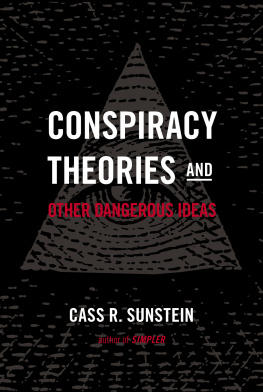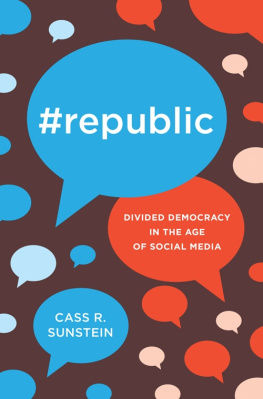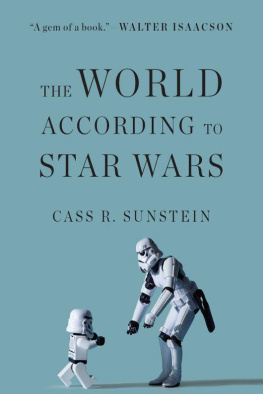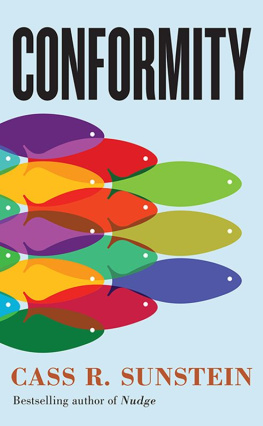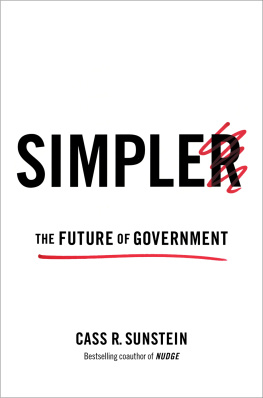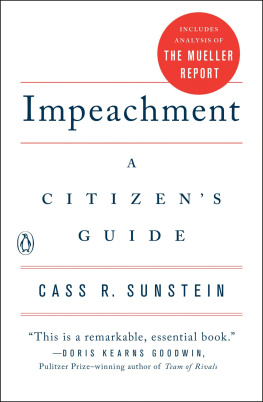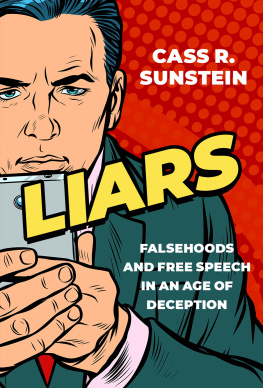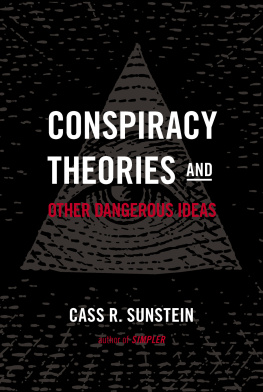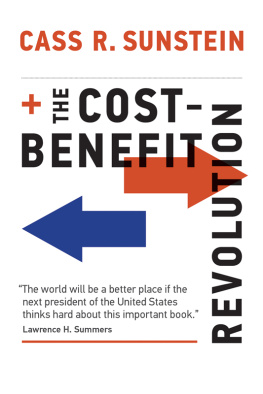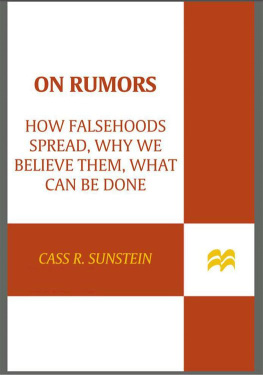SELECTED LIST OF OTHER TITLES BY CASS R. SUNSTEIN
AUTHOR
Simpler: The Future of Government
After the Rights Revolution: Reconceiving the Regulatory State
Democracy and the Problem of Free Speech
Free Markets and Social Justice
Going to Extremes: How Like Minds Unite and Divide
Infotopia: How Many Minds Produce Knowledge
Legal Reasoning and Political Conflict
On Rumors: How Falsehoods Spread, Why We Believe Them, What Can Be Done
Republic.com 2.0
The Second Bill of Rights: FDRs Unfinished Revolution and Why We Need It More Than Ever
Why Societies Need Dissent
COAUTHOR
Nudge: Improving Decisions About Health, Wealth, and Happiness


Simon & Schuster
1230 Avenue of the Americas
New York, NY 10020
www.SimonandSchuster.com
Copyright 2014 by Cass Sunstein
All rights reserved, including the right to reproduce this book or portions thereof in any form whatsoever. For information, address Simon & Schuster Subsidiary Rights Department, 1230 Avenue of the Americas, New York, NY 10020.
First Simon & Schuster hardcover edition March 2014
SIMON & SCHUSTER and colophon are registered trademarks of Simon & Schuster, Inc.
For information about special discounts for bulk purchases, please contact Simon & Schuster Special Sales at 1-866-506-1949 or business@simonandschuster.com.
The Simon & Schuster Speakers Bureau can bring authors to your live event. For more information or to book an event, contact the Simon & Schuster Speakers Bureau at 1-866-248-3049 or visit our website at www.simonspeakers.com.
Designed by Claudia Martinez
Jacket design by Jason Heuer
Jacket illustrations by Mark Stutzman
Library of Congress Cataloging-in-Publication Data
Sunstein, Cass R.
Conspiracy theories and other dangerous ideas / Cass R. Sunstein.
pages cm
1. Conspiracy theories. I. Title.
HV6275.S86 2014
001.9dc232013012476
ISBN 978-1-4767-2662-5
ISBN 978-1-4767-2664-9 (ebook)
CONTENTS

Climate Change Justice (with Eric A. Posner)
PREFACE

Why do intelligent people believe conspiracy theories, even when they are utterly baseless? Why does false information spread and sometimes incite violence? What rights do human beings have? Do we have a right to education or health care? What makes people happy? Do animals have rights? Is there a right to marriage? If so, who gets to marry? Does the United States owe poor nations compensation for climate change? Amidst the most fundamental disagreementsnot least on these questionshow can we proceed? And just who are minimalists and trimmers, anyway?
Of the hundreds of academic articles I have written, the most controversial appear in these pages. Academic articles do not usually get a lot of attention, but many of the chapters here escaped anonymity. Some of them even achieved a modest degree of public notoriety. One reason is that on dozens of occasions, Glenn Beck, the television and radio personality, described me on national television as the most dangerous man in Americaapparently because of the essays here, especially those involving Franklin Delano Roosevelt, conspiracy theories, and the rights of animals. I dont know how many people actually read those papers, but I do know that they helped produce a lot of hate mail (and a few death threats).
The unexpected notoriety was a product of the fact that from 2009 to 2012, I was privileged to serve as the administrator of the White House Office of Information and Regulatory Affairs (OIRA). The OIRA administrator is often called the nations regulatory czar, and while the United States has no czars, the administrator does have a good deal of authority. To get that particular job, you have to be nominated by the president and confirmed by the Senate. At least in the current period, the writings of Senate-confirmed presidential appointees are subject to intense scrutiny. And if someone with a lot of writing is fortunate enough to be confirmed, the scrutiny is likely to continue, certainly while he serves, and perhaps even after. I didnt quite anticipate this. I certainly didnt anticipate the degree of animosity that would be generated by some of the articles in this book.
In many nations, rational people end up believing crazy things, including (false) conspiracy theories. Those crazy thoughts can lead to violence, including terrorism. Many terrorist acts have been fueled by false conspiracy theories, and there is a good argument that some such acts would not have occurred in the absence of such theories. The key pointand, in a way, the most puzzling and disturbing oneis that the crazy thoughts are often held by people who are not crazy at all.
The essay on conspiracy theories was written in the aftermath of the attacks of 9/11, but the lessons are far more general. It was originally coauthored with Harvard law professor Adrian Vermeule, but it has been significantly revised and updated for this book. The focus is on threatsespecially terrorist threatsthat arise when people in other nations believe false conspiracy theories about the United States. Its central goal is to explore how information tends to spread, even to go viral, among like-minded people. And while some people think that the topic of conspiracy theories is narrow and specialized, the discussion bears on the spread of false information of many different kinds, not least in the internet era.
A primary focus of the essay is the crippled epistemology of extremism, a brilliant phrase that I borrow from political scientist Russell Hardin. In my view, the idea of crippled epistemology is full of implications. All of us have, at least to some degree, a crippled epistemology, in the sense that there is a lot that we dont know, and we have to rely on people we trust. We lack direct or personal evidence for most of what we think, especially about politics and government. We are often confident in what we believe, but we dont have reason to be. Much of what we know can turn out to be badly wrong. Chapter 1 explores the mechanisms that account for this troubling fact, which is of great importance throughout the world. And while the central concern is how conspiracy theories spreadnot what to do about themthere is a brief discussion of a possible approach, which is to counteract crippled epistemologies through cognition infiltration, an admittedly provocative (and, I confess, probably unfortunate) term that is meant to refer to how truth tellers can dispel falsehoods.
Somehow the argument of this essay, or some version of it, has gone viral, at least in certain circles. The irony is that the essay itself has been subject to the very mechanisms it explores about the spread of false information. Indeed, those mechanisms worked so directly and so precisely that many people contended, and apparently continue to believe, that while in government, I attempted to implement some of its alleged prescriptions. (I had no involvement with any such issues during my time in the Obama administration.)
Here are some examples. The website Salon featured a lengthy essay entitled Obama Confidants Spine-Chilling Proposal, which said that I want to cognitively infiltrate antigovernment groups. One blog post about the essay was called Got Fascism? In fact, an entire book was written about the essay, Cognitive Infiltration: An Obama Appointees Plan to Undermine the 9/11 Conspiracy Theory. (As of this writing, the book has forty-one reviews on Amazon.comall of them with perfect five-star ratings.) The essay has been seen as dangerous partly because it was read to suggest that I had a plan to infiltrate not only foreign organizations that believe the United States was responsible for the 9/11 attacks, and that seek to threaten our security, but also conservative organizations as a whole. (Of course, nothing could be further from my mind.)
Next page
